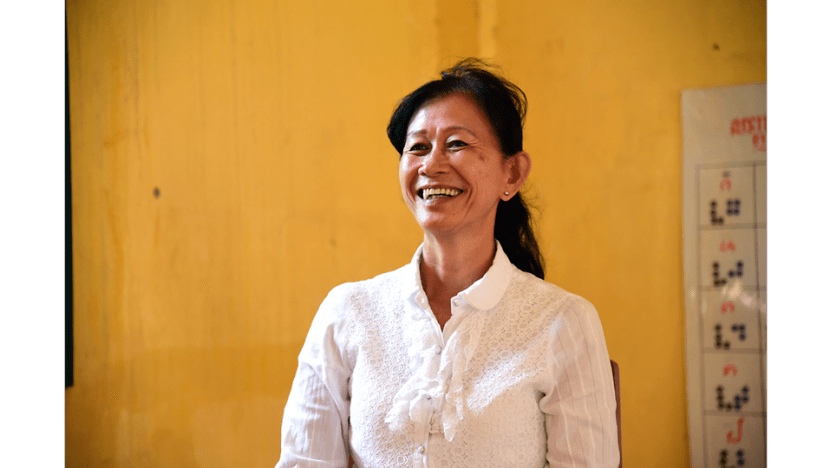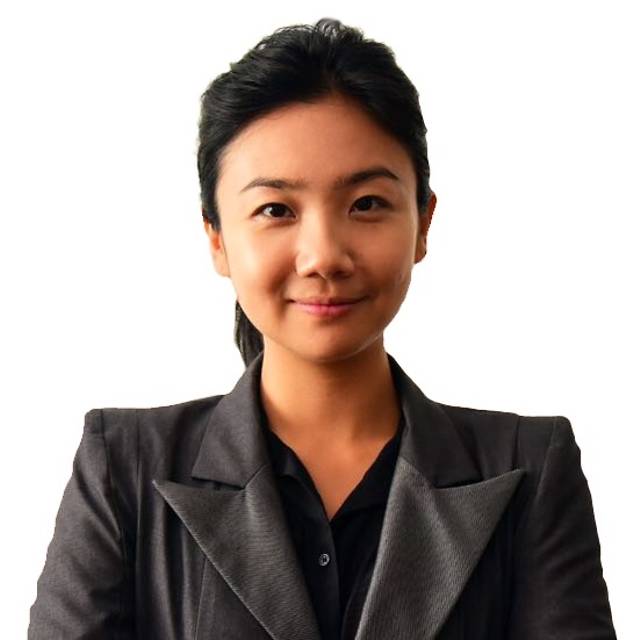Cambodian teacher lights up world for blind students
Phalla Neang is the first teacher of the blind in Cambodia and the pioneer of Khmer Braille. Throughout her life, she has been fighting to show that the visually impaired are not so different from others. Channel NewsAsia’s Pichayada Promchertchoo explores the world of the Cambodian blind.

Phalla Neang, 56, is the first Braille teacher in Cambodia. She has spent more than 25 years to educate blind children in her country, where the visually impaired often face neglect and social stigma. (Photo: Pichayada Promchertchoo)
PHNOM PENH: Shafts of golden sunlight streamed through a row of green-framed windows. They glinted on dozens of shiny symbols – an unfamiliar representation of the Khmer and English alphabets as well as Hindu-Arabic and Roman numerals. Each of them was formed by small raised dots in red, black and blue, glued to white cardboard papers on the mustard yellow walls.
The classroom was a burst of colours. But for its occupants, darkness was all they could see.
"Hello everybody. How are you all doing?" Phalla Neang greeted her students as she entered the classroom. None of them could see her kind face or her broad smile. Yet they could tell from the familiar voice it was Miss Phalla who would be teaching them mathematics that morning.

Phalla Neang plays with her student, Phorn Srey Keo. (Photo: Pichayada Promchertchoo)
While doing their work, the pupils were all smiles and laughter. The blind students and their teacher were reunited for the first time after two months of school holidays.
“It's boring at home. I have to stay at my house and can't go anywhere. When someone passes by, it also makes me feel bad about myself,” said 13-year-old Phorn Srey Keo from Kondal Province.
“I like my friends and all the staff members here.”
Some classrooms were empty as many students were still travelling from the provinces to resume their studies at Krousa Thmey School. Meaning “new family”, Krousa Thmey is the first and only organisation that offers comprehensive education for blind children in Cambodia, where the visually impaired often suffer from neglect and social stigma.
“Cambodians don’t like blind children because they think these kids have committed sins in their past life. So, parents often keep them at home. They don’t want anyone to know they have a blind child,” Phalla said.

Blind students can rarely access education in public schools because Cambodia's education system does not support blind children. (Photo: Pichayada Promchertchoo)
Despite the national education-for-all scheme, public schooling remains almost inaccessible to blind Cambodians. Educational materials for them are inadequate and teaching techniques at public schools are not designed for those who cannot see. Many blind children have ended up on the streets in big cities as beggars.
According to the Association of the Blind in Cambodia’s (ABC) most recent statistics, about 52,000 people in Cambodia are blind. Many of them are struggling in their day-to-day lives.
"There is not much support for blind people in Cambodia. The public doesn’t understand these people are normal. The blind cannot access public services and are still discriminated against," ABC Director Boun Mao told Channel NewsAsia. "The situation is better than before but it’s not good enough.”
A TEACHER FROM A REFUGEE CAMP
Over the past three decades, Phalla has been fighting to improve the lives of Cambodia’s sightless population and remove the social stigma attached to them through education.

Pen Thi Ney, 12, says he wants to teach maths when he grows up. (Photo: Pichayada Promchertchoo)
Her devotion to helping the blind blossomed inside a refugee camp on the Thai-Cambodian border in 1986, when the United Nations was recruiting volunteers to teach disabled children. Many of them were victims of the atrocious Khmer Rouge regime, which wiped out nearly two million of Cambodia’s population.
Phalla joined other volunteers from her own country, Thailand and the United States in a training programme before beginning her career in teaching. She became director of the UN school, where she worked for five years.
“I want them to have knowledge like normal students do. They have the right to education like other children. That’s why I returned to Cambodia,” the 56-year-old said. But there was no school for blind children in her country then.

"I like studying here because they use Braille and I can learn," Pen Thi Ney says. (Photo: Pichayada Promchertchoo)
That did not last long. Phalla was soon approached by Krousa Thmey – a French NGO that was running an orphanage for Cambodian children in Phnom Penh. Its founder Benoit Duchateau-Arminion was looking for a teacher for a blind boy, who wondered why he could not go to school like other orphans.
Phalla became the first Braille teacher in Cambodia. She also helped Krousa Thmey open the first school for blind children in the country. It started out in Chbar Ampou with eight students and three teachers, all from refugee camps.
“No teacher in Phnom Penh wanted to teach blind children then and parents didn’t let their children come to study. They didn’t believe blind kids could learn,” Phalla said, adding she had to knock on doors in search for blind children to join her class.

Blind children are often discriminated against in Cambodia. (Photo: Pichayada Promchertchoo)
Today, Krousa Thmey operates five schools nationwide – two in Phnom Penh with the others in Siem Reap, Battambang and Kampong Cham. It has 174 employees working to assist and educates 350 blind students and 600 others who are deaf. They are provided with comprehensive education in Braille that follows the national curriculum, from kindergarten to high school.
Students are also given additional English, computer and music lessons, as well as holding an orientation class for newcomers to help them rely on themselves. The school’s inclusive education policy also means students get to spend half a day studying at public schools five times a week.
“Our students can do their revision with our teachers here, while those at public schools have to pay for private lessons after class,” Phalla said, adding proudly every blind student from Krousa Thmey can pass the national examination for grade 12, which is the qualification students need to finish high school.
In 2020, the school will transfer its education programme to the Education Ministry and become a public school.
THE BIRTH OF KHMER BRAILLE
At Krousa Thmey, every blind student is taught Braille. However, English Braille, which is widely-used internationally, does not support Cambodia’s education system, which is mostly carried out in Khmer.

Khmer Braille is used at Krousa Thmey School. The current system was developed by Phalla Neang. (Photo: Pichayada Promchertchoo)
As a result, Phalla developed a new system known as Khmer Braille to reflect local grammar and writing systems, which she and other teachers at the school have continued to develop as they try to catch up with the evolving language.
"When I was at the refugee camp, I worked with Americans, Thais and Cambodians to invent Khmer Braille to teach blind students there. But when I returned to Cambodia, I developed the system to make it grammatically correct," she said.

"I want to become an English teacher when I grow old." (Photo: Pichayada Promchertchoo)
Her students are familiar with both Khmer Braille and English Braille and are taught various subjects. The moment they graduate from the school, Phalla believes they will know everything they need to survive in society independently.
“They’re blind but they can think and remember just like we do. We give them eyes to see, and that is knowledge. Before I die, I want to see blind people being able to secure jobs and live independently without being discriminated against,” the Cambodian teacher said.
“So open your mind and let them join the society.”
Follow Pichayada Promchertchoo on Twitter @PichayadaCNA











